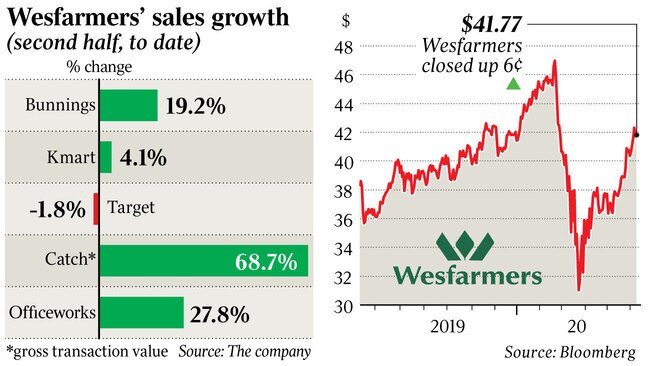BOOT test a hurdle for industrial relations reform: Wesfarmers CEO Rob Scott
Wesfarmers chief executive Rob Scott has urged business and unions to put job creation at the centre of any reform talks.

Wesfarmers chief executive Rob Scott has urged business and unions to put job creation at the centre of any reform talks, but cited the slow pace of enterprise agreements and sometimes unworkable “better off overall test” as an impediment to industrial relations reform.
He said it was during a time of recession that new ways of working and new workplace systems were called for to save jobs.
Mr Scott, whose Perth-based conglomerate is one of the nation’s biggest private sector employers with more than 105,000 staff, welcomed Scott Morrison’s speech last month to the National Press Club where he called on employer groups and unions to “put their weapons down” and pursue an Accord-like deal, and highlighted the urgent need for the economy to create new jobs.
However, Mr Scott was concerned that any working groups brought together by the federal government to tackle the prickly issue of the way enterprise bargaining agreements are formulated and executed, particularly when it comes to the “better off overall test” (BOOT), can scupper an otherwise good deal.

“It’s really about the timeliness of them (enterprise agreements) and removing some of the technical obstacles that work against creating EBAs that share the benefits with the majority of team members,’’ Mr Scott said on Tuesday, as Wesfarmers reported a trading update for its retail arms that showed surging sales at Bunnings and Catch Group.
“So the BOOT test is a technical issue that means you need to be able to demonstrate as part of an EBA that every single individual is better off, so you can imagine how complex that is when you have 100,000 team members working different shifts.
“You can have a situation where over 95 per cent of your team are materially better off and a handful of them are worse off simply by virtue of unique shifts they perform, then the EBA will not be valid. So that is one of the technical issues that many companies have been working through.”
The BOOT test is likely to present a key battleground when business and unions bunker down for talks on a new workplace environment.
Last year Business Council of Australia chief executive Jennifer Westacott tagged the Fair Work Act’s “better off overall” test as a “productivity killer” that should be replaced by a test that requires groups of employees only to be better off than the award minimum rather than every individual employee.
The union movement has previously warned scrapping of the test would see a return to the WorkChoices era where they claim thousands of workers were pushed on to substandard agreements because there was no genuine legal safeguard to prevent the abuse of the bargaining process.
Mr Scott called on all sides to consider the threat to employment during a recession, and shift their minds to tackling the issue with a new set of industrial relations tools.
“What’s different? We are in a recession. For the first time in 30 years we are in a recession and unfortunately in a recession people lose their jobs and it requires a different thought process to put in place settings that will encourage employment.
“Something business and unions are both very aligned with are the desire to encourage more enterprise agreements, but at the moment we have systems and processes that work against EBAs. Ultimately EBAs, if structured the right way, result in a sharing of benefits between team members and business and enables Australian business to be more competitive.
“It is hard to see a business that would benefit more from full employment and Australia being successful than Wesfarmers, so I think we have a lot to gain to see more people in jobs, to see more investment,” Mr Scott said.
“We also operate in a really competitive environment so we need to make sure our businesses are fit to compete with the best in the world, many of which are operating here in Australia.
“It is a unique opportunity for business, for unions to talk about what we are going to do to create more jobs.”
The trading update for Wesfarmers’ key retail arms — Bunnings, Kmart, Target, Officeworks and Catch — showed most of the businesses had booked rocketing sales through the pandemic with revenue at hardware chain Bunnings and online marketplace Catch surging.
Bunnings sales growth of 5.8 per cent in the first half of the financial year has accelerated to 19.2 per cent in the second half to date, while sales were up 11.3 per cent for the financial year so far.
At Kmart sales were up 4.1 per cent in the second half to date and up 6.1 per cent for the financial year, while at struggling Target, sales improved from being down 4.3 per cent in the first half to be down 1.8 per cent in the second half, and 3.4 per cent lower overall for the financial year.
Catch, bought last year by Wesfarmers for $230m, was the best performer with gross transaction value lifting 68.7 per cent in the second half to date, compared to a 21.4 per cent increase in the first half, and up 43.7 per cent for the financial year. Sales at Officeworks for the second half to date rose 27.8 per cent and were up 19.3 per cent for the financial year.
Wesfarmers said Bunnings has invested about $20m in additional cleaning, security and protective equipment to respond to COVID-19 over the last three months. Bunnings will also incur costs of about $70m in the 2020 financial year associated with trading restrictions in New Zealand, the permanent closure of seven small-format stores during the half, and the accelerated rollout of its online offering.



